Overview of this Presentation: Thirty years of family research have shown that high-conflict homes are incredibly damaging to children. When researchers studied kids brought up in destructive homes, they found that the kids whose parents divorced had higher wellbeing than kids whose parents stayed married. Research also shows that while kids in two-parent married homes do better on average than kids from divorced homes, it’s only slightly better, not dramatically different (see Myth 7 below). The more toxic the home, the better children do after divorce relatively speaking. So to oversimplify: research has found:
If the home is toxic, divorce is good for kids. If the home is safe, divorce is bad for kids
Video version of this talk: Click here “7 Reasons to Have Hope for Your Kids after Divorce and Abuse.”
Download the slides and script here: “7 Reasons to Have Hope for Your Kids after Divorce and Abuse.”
This presentation debunks 7 myths about kids and divorce:
Myth 1—Divorce will destroy your kids
Myth 2—If you divorce, your kids will divorce, themselves, and they won’t value marriage
Myth 3—It’s always best to stay for the kids
Myth 4—If you divorce, your kids will suffer even more than they are now and it will never get better
Myth 5—If you remarry, your kids will likely be abused by the new step-parent.
Myth 6—Divorce itself causes the child’s problems
Myth 7—Kids are likely to do drugs or alcohol — or have severe behavior problems in school—if you divorce
About Me: If you’re new to my blog, read this first. I’m a committed Evangelical Christian. I attend church, tithe, serve, volunteer, and lead Bible studies. I started leading Christian divorce recovery groups in conservative churches in 1998. I believe in the sanctity of marriage. Marriage ought to be loving, safe, and respectful. But what if a marriage isn’t safe and loving, it’s actually the opposite? What if it’s destructive and you need a Life-Saving Divorce? That’s part of my mission, to help clear away the false narratives about kids and divorce.
SCRIPT:
So my topic today is “7 Reasons to Have Hope for your Children after Abuse and Divorce.” Let me say right up front: As a devout person of faith, I believe in the sanctity of marriage. I believe that God meant marriage to be loving, undefiled, and lifelong. But what happens when our marriages are the opposite? What happens if the home is destructive? Today I’m talking about the pros and cons of divorce for kids. We were always taught that divorce was universally bad for children, that divorce destroys kids. But is that really true? No, not when we’re talking about high-conflict situations.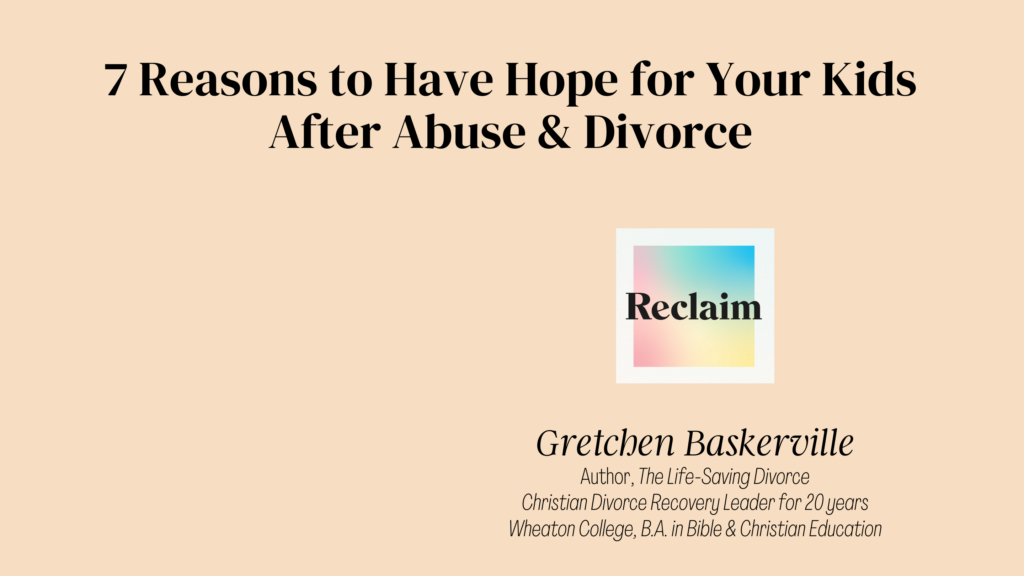
Slide 2:
This talk is not for someone who wants an “I’m bored” divorce or “I feel unfulfilled” divorce or “I miss the party life” divorce. It’s for people are considering a divorce for very serious reasons, what I call the “life-saving reasons”: a pattern of sexual immorality, physical violence, chronic emotional coercion, life-altering addictions, abandonment or severe neglect. They aren’t looking for a grass-is-greener divorce. They are looking for relief from the chaos. They want safety. And that’s what we’ll discuss today. If you were brought up in a religious culture, you probably heard that there are very few of these genuinely destructive situations, that MOST divorces are for something frivolous. But it turns out that about half of divorces are for very serious things. In multiple surveys, researchers have found that about half of divorces are for something destructive, for example a pattern of sexual immorality, physical abuse, chronic emotional abuse, life-altering addictions, and abandonment/neglect. We’ve all been told we must “stay for the kids” even in situations that are driving us into despair, but have you noticed that few pastors, Christian marriage authors, or radio programs discuss how violence, hostility, and betrayal in a home affect kids? The reality is that divorce is NOT universally detrimental to children. But a highly toxic home is. SLIDE 3: Here’s what we’ll cover today
SLIDE 3: Here’s what we’ll cover today
- Quick History Lesson on Divorce in the U.S.
- 7 false messages about kids and divorce
- 7 answers to those claims from the past 30 years of research
- When is divorce good for kids? And when is it bad?
Big Takeaway
When the marriage is good, divorce is bad for kids. When the marriage is bad, divorce is good for kids. Where there are serious problems in a home, it is often an unsafe place for both adults and kids. It’s not that warm nest in the storms of life that marriage ought to be. And researchers have documented it. Now, I’m not a licensed counselor, a psychologist, or a family sociologist, I’m a Christian divorce recovery leader, but I’ve learned a lot in the past few years from reading the actual scientific studies about kids and divorce, not relying on quotes I see on other organizations’ websites. I have listed the source for each of these studies on the slides so you can verify them. SLIDE 4:
SLIDE 4:
7 False Messages About Kids and Divorce
Let’s face it, any mature person who took marriage seriously knew there would be ups and downs. We were willing to go the distance. We knew there would be times for patience and forgiveness. We reconciled over and over. We got counseling. We weren’t quitters who took the easy way out. And we want to live a righteous life. We wanted to be seen as committed people who sacrificed for the good of our kids. We didn’t want anyone to judge us. So we gave our destructive marriage 100%. We stayed because these 7 false messages pressured us to stay in a destructive marriage.
Let’s take a look at them. We are told that these are universally true about divorce and divorcees. Later we will take them apart.
Myth 1—Divorce will destroy your kids
Myth 2—If you divorce, your kids will divorce, themselves, and they won’t value marriage
Myth 3—It’s always best to stay for the kids
Myth 4—If you divorce, your kids will suffer even more than they are now and it will never get better
Myth 5—If you remarry, your kids will likely be abused by your new husband or boyfriend
Myth 6—Divorce itself causes the child’s problems
Myth 7—Kids are likely to do drugs or alcohol — or have severe behavior problems in school—if you divorce

SLIDE 5: QUICK HISTORY LESSON ABOUT DIVORCE IN THE U.S. IN THE PAST 50 YEARS
I want to give you a quick history lesson. Most of us are younger than 70 years old. And that means most of us don’t remember the United States before no-fault divorce laws passed state by state starting in 1969, championed by then-Governor Ronald Reagan of California. But believe it or not, there was a time when you could go to court, ask for a divorce, bring evidence to a judge of your husbands’ violence, financial fraud, emotional cruelty, or serial adultery, and the judge could say, “No, divorce denied,” and send you back home to your spouse. And you had little recourse. So in 1970, after no-fault divorce laws went into effect one state at a time, the floodgates opened, and tens of thousands of people who were in abusive or unfaithful marriages—but didn’t have enough evidence or a good enough attorney or enough money—finally escaped. The family researchers at major universities jumped on this opportunity to study this major social change. That was the year that an army of family sociologists started studying the effects of divorce on society, on domestic violence, suicide, homicide, and especially on kids. What a perfect opportunity to do long 10-, 20- and 25-year studies! So there is an amazing amount of research starting 50 years ago. From the early 1970s, for the next 14 years, the majority of U.S. states passed no-fault divorce laws, and the pent-up demand for divorce went through the roof. It hit the peak in the late 1970s and early 1980s and has declined since then. In fact, the divorce rate today is about as low as it was 50 years ago.
People always say, “Well, of course the divorce rate has dropped! Fewer people are getting married.” And while it is indeed true that the marriage rate has dropped and cohabitation has increased, that does not affect this graph because it measures divorce as a
percentage of married people not a percentage of the population of the U.S. If you are a skeptic or a numbers geek, I’ve put the formula at the bottom of this slide.
As you might expect, the studies done in the 1970s through the early 1980s showed about 1 in 4 kids from divorced homes has some serious issues. But starting in the later 1980s and very strongly in the 1990s (when the studies had already accumulated more than 2 decades of information, it became evident that divorce wasn’t as destructive as had been feared.
Study after study over the past 30 years have shown that about 8 in 10 children from divorced homes have no serious lifelong emotional, psychological, or social problems at all.
 SLIDE 6: 8-in-10 Kids have no long-term serious problems after divorce
The truth is: about 8 in 10 children from divorced homes have no serious lifelong emotional, psychological, or social problems at all.
Some critics are going misquote me and say: “Gretchen denies that kids feel any pain, or sadness, or any grief. Gretchen is claiming that kids just sail through divorce without any negative feelings at all. That’s not what I’m saying.”
I know that children will likely feel pain, sadness, confusion, and grief. Mine did. They may miss the other parent and cry a lot. Mine did. But on average kids go back to their normal level of emotional health after the first two stressful years. Having two years of additional stress—from moving, finding a new school, etc.—are very different from having serious emotional, psychological, or social problems for the rest of their lives.
Now if you’ve got one of those 1-in-100 hostile divorces, then your kids are going to endure more than two years of stress.
Now look at the other side of this graph. This shows that nine and 10 kids from two parent intact families have no serious problems, but one child and 10 does. So the idea that being brought up in a 2-parent married home guarantees you automatic immunity from all serious problems is false. There is simply a certain percentage of our population that has serious issues.
SLIDE 6: 8-in-10 Kids have no long-term serious problems after divorce
The truth is: about 8 in 10 children from divorced homes have no serious lifelong emotional, psychological, or social problems at all.
Some critics are going misquote me and say: “Gretchen denies that kids feel any pain, or sadness, or any grief. Gretchen is claiming that kids just sail through divorce without any negative feelings at all. That’s not what I’m saying.”
I know that children will likely feel pain, sadness, confusion, and grief. Mine did. They may miss the other parent and cry a lot. Mine did. But on average kids go back to their normal level of emotional health after the first two stressful years. Having two years of additional stress—from moving, finding a new school, etc.—are very different from having serious emotional, psychological, or social problems for the rest of their lives.
Now if you’ve got one of those 1-in-100 hostile divorces, then your kids are going to endure more than two years of stress.
Now look at the other side of this graph. This shows that nine and 10 kids from two parent intact families have no serious problems, but one child and 10 does. So the idea that being brought up in a 2-parent married home guarantees you automatic immunity from all serious problems is false. There is simply a certain percentage of our population that has serious issues.

SLIDE 7:
So what did these early family researchers find? Here’s a quote from Dr. Mavis Hetherington. She was one of the pioneers who jumped on this right away, in the early 1970’s. She followed 1400 families for NEARLY 30 years. “In the short run, divorce is brutally painful to a child. But its negative long-term effects have been exaggerated…” And we’ll talk more about this.
 SLIDE 8:
Myth 2: If you divorce, your kids will divorce and they won’t value the sanctity of marriage
This myth says “If You Divorce, Your Kids Will Divorce”
Truth: The majority of marriages of kids from divorced homes are lifelong.
The majority of people who marry in the U.S. have lifelong marriages, and that includes children of divorce.
Now it is true that children from divorced homes are a bit more likely to get divorced. The top researcher for the past 22 year on this topic is Dr. Nick Wolfinger of the University of Utah. Last year he said the figures are these:
. As of 2018, adult children of divorced parent have a 47% divorce rate.
. Those people whose parents did not divorce have a 40% divorce rate.
. In other words: There’s not a huge difference between these two groups, only 7%. Thirty years ago the gap was much greater. But gap has steadily narrowed in the past 25 years.
SLIDE 8:
Myth 2: If you divorce, your kids will divorce and they won’t value the sanctity of marriage
This myth says “If You Divorce, Your Kids Will Divorce”
Truth: The majority of marriages of kids from divorced homes are lifelong.
The majority of people who marry in the U.S. have lifelong marriages, and that includes children of divorce.
Now it is true that children from divorced homes are a bit more likely to get divorced. The top researcher for the past 22 year on this topic is Dr. Nick Wolfinger of the University of Utah. Last year he said the figures are these:
. As of 2018, adult children of divorced parent have a 47% divorce rate.
. Those people whose parents did not divorce have a 40% divorce rate.
. In other words: There’s not a huge difference between these two groups, only 7%. Thirty years ago the gap was much greater. But gap has steadily narrowed in the past 25 years.
 Slide 9:
You’ve probably seen this claim that if you divorce, your kids will view cohabitation more favorably. Notice that this 2007 article doesn’t distinguish by the level of tension in the home, they lump all divorced families in the same bucket. Perhaps the author missed the research done in the mid-1990s when Dr. Paul Amato of Penn State wondered if divorce affected children differently if the divorce was for serious reasons, not frivolous reasons, a divorce to find relief from an abusive home for example. He discovered that it did make a difference in how they viewed divorce. And then he and Danelle DeBoer researched the question: If the parents’ divorce was due to something very serious like physical violence or emotional cruelty, did those children lose respect for the institution of marriage?
And they found that kids from troubled marriages that led to divorce, have strong commitments to marriage. He said, …
“Why is it that some offspring with divorced parents maintain a strong commitment to their marriages, even during periods of dissatisfaction?
The present study suggests one set of circumstances; that is, parental divorce may not undermine offspring’s commitment to marriage if it ends an especially discordant and aversive parental marriage.”
— Paul R. Amato and Danelle D. DeBoer (1995)
In other words, our teenagers and adult kids know what marriage ought to look like. They know that marriage ought to be safe and loving, or at least respectful. They know that an abusive marriage is no marriage at all.
Slide 9:
You’ve probably seen this claim that if you divorce, your kids will view cohabitation more favorably. Notice that this 2007 article doesn’t distinguish by the level of tension in the home, they lump all divorced families in the same bucket. Perhaps the author missed the research done in the mid-1990s when Dr. Paul Amato of Penn State wondered if divorce affected children differently if the divorce was for serious reasons, not frivolous reasons, a divorce to find relief from an abusive home for example. He discovered that it did make a difference in how they viewed divorce. And then he and Danelle DeBoer researched the question: If the parents’ divorce was due to something very serious like physical violence or emotional cruelty, did those children lose respect for the institution of marriage?
And they found that kids from troubled marriages that led to divorce, have strong commitments to marriage. He said, …
“Why is it that some offspring with divorced parents maintain a strong commitment to their marriages, even during periods of dissatisfaction?
The present study suggests one set of circumstances; that is, parental divorce may not undermine offspring’s commitment to marriage if it ends an especially discordant and aversive parental marriage.”
— Paul R. Amato and Danelle D. DeBoer (1995)
In other words, our teenagers and adult kids know what marriage ought to look like. They know that marriage ought to be safe and loving, or at least respectful. They know that an abusive marriage is no marriage at all.
 Slide 10:
Myth 3 : It’s Always Best to Stay for the Kids
Truth: Sometimes it’s best to leave for the kids
So When is Divorce Actually Good for Kids?
By the mid-1990s researchers already knew the difference between divorces that broke up peaceful homes, and divorces that broke up tense scary homes.
This highly complex chart from Dr. Paul Amato from Penn State, compares 3 different factors (and by the way, the emoji faces are mine, not his) and it was created for professors, demographers, and grad students. It’s hard to get your mind around, so I took the same information and created a little simple visual summary of this in the next slide.
Slide 10:
Myth 3 : It’s Always Best to Stay for the Kids
Truth: Sometimes it’s best to leave for the kids
So When is Divorce Actually Good for Kids?
By the mid-1990s researchers already knew the difference between divorces that broke up peaceful homes, and divorces that broke up tense scary homes.
This highly complex chart from Dr. Paul Amato from Penn State, compares 3 different factors (and by the way, the emoji faces are mine, not his) and it was created for professors, demographers, and grad students. It’s hard to get your mind around, so I took the same information and created a little simple visual summary of this in the next slide.

SLIDE 11:
It turns out that family researchers have identified five types of marriages on a continuum of discord (which you can call tension)—so from very low discord on the far left to very high discord on the far right. Sometimes researchers use the term “high conflict” versus “low conflict.” Or “high distress” vs “low distress.” But often that doesn’t quite capture the meaning, because there may be no visible conflict, no yelling or hitting, and no visible discord, especially if you’re dealing with someone who is covertly manipulative or someone who is living a secret double life of serial infidelity or pedophilia. So if you don’t identify with the word “discord” or “conflict,” try the concept of desperation or tension or distress. From the child’s standpoint a low-distress home is one where they feel supported (safe, loved and accepted). In a high-distress home they feel the home is aversive, it’s tense, people are walking on eggshells, apprehensive that the other shoe will drop. Basically divorce is bad for kids if the home feels safe, understood, and encouraging. And divorce is good for kids if they feel the opposite. Keep an eye on that pink face, the High-Discord family. Slide 12:
So how bad is an abusive or toxic home for children? Well researchers found in a high-discord home, kids whose parents divorced had about 1-1/2 times better wellbeing than the kids whose parents stay married.
You’ll see that the divorce did affect them negatively, but the effects of abuse in a toxic married home were even worse.
Slide 12:
So how bad is an abusive or toxic home for children? Well researchers found in a high-discord home, kids whose parents divorced had about 1-1/2 times better wellbeing than the kids whose parents stay married.
You’ll see that the divorce did affect them negatively, but the effects of abuse in a toxic married home were even worse.
 SLIDE 13
And in the case of very high-discord homes, it was about 10 times better for those kids whose parents divorced than for kids whose parents stayed married. I’m not saying that divorce doesn’t affect kids’ well-being, I’m just saying that abuse is far worse.
SLIDE 13
And in the case of very high-discord homes, it was about 10 times better for those kids whose parents divorced than for kids whose parents stayed married. I’m not saying that divorce doesn’t affect kids’ well-being, I’m just saying that abuse is far worse.
 SLIDE 14
So the rule of thumb, to oversimplify it, is this: if the marriage is good or OK, then divorce is bad for kids. If the marriage is bad, divorce is good for kids.
So let’s look at the diagram: on the left side are parents who divorced when there was no pattern of serious marriage-endangering sins in their home. They were less positive about their life. Their children were much more likely to divorce themselves, and the kids had lower commitment to marriage.
In contrast, on the right side, The parents who divorced to escape a highly toxic home found increased happiness. And their kids were not as likely to divorce AND those kids had stronger commitment to marriage than kids from divorced lower-conflict homes.
SLIDE 14
So the rule of thumb, to oversimplify it, is this: if the marriage is good or OK, then divorce is bad for kids. If the marriage is bad, divorce is good for kids.
So let’s look at the diagram: on the left side are parents who divorced when there was no pattern of serious marriage-endangering sins in their home. They were less positive about their life. Their children were much more likely to divorce themselves, and the kids had lower commitment to marriage.
In contrast, on the right side, The parents who divorced to escape a highly toxic home found increased happiness. And their kids were not as likely to divorce AND those kids had stronger commitment to marriage than kids from divorced lower-conflict homes.

SLIDE 15
Myth 4: Your Kids Will Suffer Even More than They Are Now, If You Divorce
Truth: Sometimes divorce reduces or ends the suffering
Let’s look at some of the misinformation. A lot of pastors, Christian marriage book authors, and marriage-at-any-cost organizations love to fear-bomb us—and I say us because I’m a religious conservative who attends church weekly.
It very easy to find examples in media:
Here are some: “Kids suffer when moms and dads split up.”
Or this: “For a child, divorce shatters their basic concept of safety.”
Or this: “If you divorce your kids will favor cohabitation… “
We’re going to address each of these claims. First not all kids suffer when moms and dads split up, some kids were so worried about the loving parent, in this case the mother, they want her to divorce—OR not to contest the divorce if their dad files. Some kids see divorce as the best solution in a bad situation.
The claim that divorce shatters the kids’ basic concept of safety assumes that the home was safe to begin with.
But as we’ve just seen, many times the toxic parent has already made the home unsafe. Everyone’s walking on eggshells trying to keep from setting them off. So sometimes a divorce is a relief from that constant fear.
Then there’s this incredibly misleading article! (I won’t identify the organization that promotes it.) But it never tells you that the outcomes of children after divorce depend a great deal on the toxicity of the home. It suggests that all divorces are frivolous and immature, rather than some being life-saving.

SLIDE 16:
Now let’s look closer at that article. A large section of the article is headlined “Wallerstein Study.” So you would think that this article would accurately describe Wallerstein’s findings. But it doesn’t. Marriage-at-any-cost organizations quote her New York Times bestselling book, The Unexpected Legacy of Divorce, published in 2000, but they seem to quote only her divorce-is-bad-for-kids insights. Dr. Wallerstein began studying 60 families in 1971 and over a 25-year span, and made detailed observations. By the end, in 1996, only 45 families were still taking part in the study. I’ve read several of her books that discuss this study, and she states that 12 of those 45 remaining families were viewed by the children as being nearly perfect before the divorce, 23 of 45 marriages were described as “good enough,” and only 9 of those 45 families had really severe problems that disrupted parenting. That’s how she described it. So of this entire study, the vast majority of the families appear to have HAD very-low to average conflict, AND only 9 obvious high-conflict families. That’s 20% or 1 in 5 families with serious problems. So what is Dr. Wallerstein going to see? She’s going the see the majority of kids struggling in their early life, right? We could have guessed that! Let’s see what she says about those more severe cases. (And by the way, where you see underlines or bold type, that’s my emphasis of a particular phrase, not hers.)

SLIDE 17: (Just read the slide)

SLIDE 18: (Just read the slide. Notice she’s trying to defend herself against accusations that she is universally against divorce)
 Slide 19: Wallerstein had already published a book 11 years earlier saying the same types of things. And she was already seeing the media and religious and secular marriage-at-any-cost organizations misinterpret her to say all divorce is bad for kids, so she pushed back in her new 2000 book.
Here she is protesting about how her work has been misused.
Slide 19: Wallerstein had already published a book 11 years earlier saying the same types of things. And she was already seeing the media and religious and secular marriage-at-any-cost organizations misinterpret her to say all divorce is bad for kids, so she pushed back in her new 2000 book.
Here she is protesting about how her work has been misused.

SLIDE 20:
Here’s what Wallerstein said in 1989, more than 30 years ago. SLIDE 21
Here’s what she said on the first page of her New York Times best-seller in 2000.
SLIDE 21
Here’s what she said on the first page of her New York Times best-seller in 2000.
 Slide 22
Here’s Wallerstein talking about the dangers of physical AND emotional abuse
Slide 22
Here’s Wallerstein talking about the dangers of physical AND emotional abuse

SLIDE 23 (Read the quote.)

SLIDE 24 (Read the quote.)
 Slide 25
Dr. Paul Amato and his team are also quoted by media and religious and secular marriage-at-any-cost organizations, but here he is—back in 1995—saying that he, like multiple other researchers found that children are better off in single-parent families than in toxic homes.
Slide 25
Dr. Paul Amato and his team are also quoted by media and religious and secular marriage-at-any-cost organizations, but here he is—back in 1995—saying that he, like multiple other researchers found that children are better off in single-parent families than in toxic homes.
 Slide 26
If that’s not clear enough, Amato, Loomis and Booth concluded that study by saying…
Slide 26
If that’s not clear enough, Amato, Loomis and Booth concluded that study by saying…

No one told us that abuse was worse than divorce. They told us the opposite. And so whenever you see a “divorce will destroy your kids” article, written in the past 20 years, and quoting these researchers, you need to know the author of that article is not telling the whole the truth.
Slide 27:
Myth 5: If you Divorce and Remarry, the Kids Will Be Abused by their New Step-Parent
Truth: Although it happens, the likelihood is low: 25 in 1,000 step-families were found to have an incident.
So does it happen? Yes, it does but not as much as some people want you to believe.
So here are two examples of quotes I found on the Internet. The first one says the children are more likely to suffer child abuse if you divorce and remarry—or have a boyfriend. Technically that’s true, but it is a bit misleading because in reality, the incident rate is not as scary as you might believe. 25 in 1,000 families. That means 975 step-families were not found to have child abuse incident.
The second quote says the child abuse is 40 times more likely if you have a new parter. Now this one is flat-out wrong. Both of these quotes have problems because they don’t show you the figures by family type. Child abuse is one of the most studied problems in sociology, so there’s no excuse for not giving the figures or for using an old study. And that’s the problem with the second quote. The article is recent, but it’s using 35-year old data. The abuse rate has dropped dramatically since the 1980s, and it’s simply not true that step-families have a 40 time higher child abuse rate.
So let’s look at the actual numbers. In the last study by family type that I could find, the NIS4, researchers found about 4 in 1,000 married biological parent families had an incident of child abuse. And about 25 in 1,000 step-families had an incident of child abuse, and higher with boyfriends.
Is it something to be concerned about? Absolutely. If you have any suspicions about the person you’re dating or if you remarry and suddenly these abusive traits appear, get to safety, get out. But the idea that your second marriage automatically will be a disaster because your new husband will definitely abuse the kids, just isn’t supported by the numbers.

SLIDE 28: When researchers found kids of divorce who have serious problems, often they discovered that evidence of these problems existed long before the divorce. In other words, some problems are caused by the destructive home, not by the divorce itself.
(Read the slide)
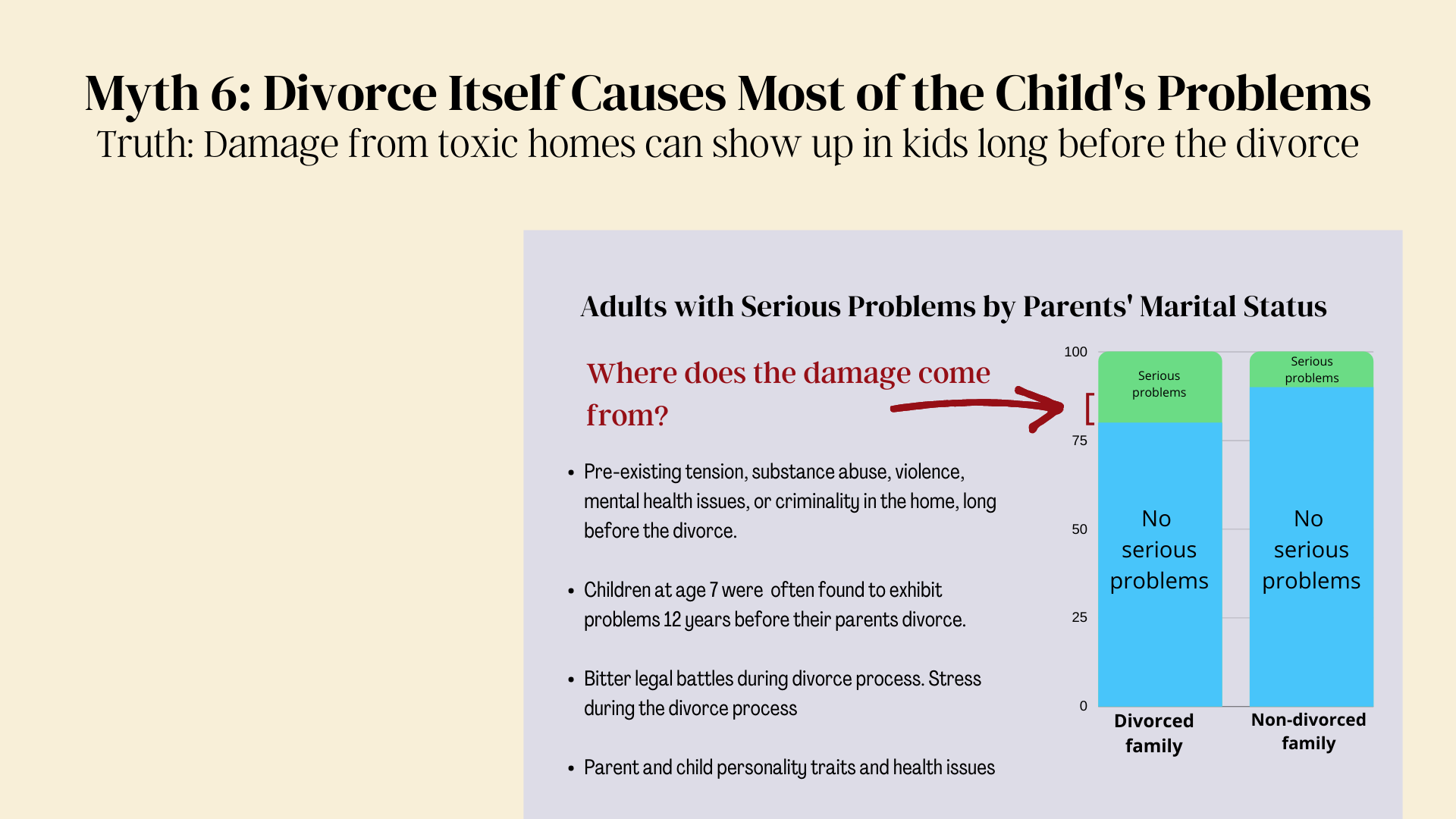
Slide 29: Myth 6: Divorce itself causes all of the child’s problems in adulthood (not the tension that that has flooded the home for years). Truth: Damage from toxic homes can show up in kids long before the divorce
As you recall, even in 2-parent married homes, 1 in 10 kids have serious issues, but where does that additional damage come from, from the divorce itself, or from problems in the marriage that existed long before the divorce?
“When children of divorced parents have problems, sometimes those problems started when the parents were still married. For example, researchers who followed the children of married parents for more than a decade, not knowing in advance whether the parents would stay married or divorce, found something very telling. Among those children whose parents did divorce and who had problems, sometimes their difficulties began as early as 12 years before the divorce. They were already “struggling” while their parents were married.”
DePaulo, Bella. Single Parents and Their Children: The Good News No One Ever Tells You (pp. 13-14). Kindle Edition.
Many people say, “My kids knew nothing. We never argued in front of them. They didn’t know about their father’s infidelity or porn or pedophilia or alcohol or financial abuse. There was no fighting!” And all I can say is that kids sense far more than we think they can. They may not know the details, but they know something is wrong, and that a marriage shouldn’t be like this.
Dr. Andrew Cherlin is another family researcher whose name you’ll find on many of the marriage-at-any-cost websites. And more than 20 years ago, he was the one who found that 7-year-olds can exhibit problems many years before their parents divorced. I’ve looked, but I haven’t seen either of THESE 2 quotes on marriage-at-any-cost websites: Here’s how he explains why people jump to the conclusion that divorce causes the child’s problems later when they are adults—
“…part of the seeming effect of parental divorce on adults is a result of factors that were present before the parents’ marriages dissolved.”So…damage was done long before the couple finally divorced. And he says—
“It is likely that, in many cases, elevated behavior problems at [age] 7 were a reaction to other sources of stress in the family such as continual marital conflict, substance abuse, or violence…” —Andrew Cherlin, Johns HopkinsTruth: The Damage we see in some children-of-divorce is from the stress in the home, not the divorce itself.
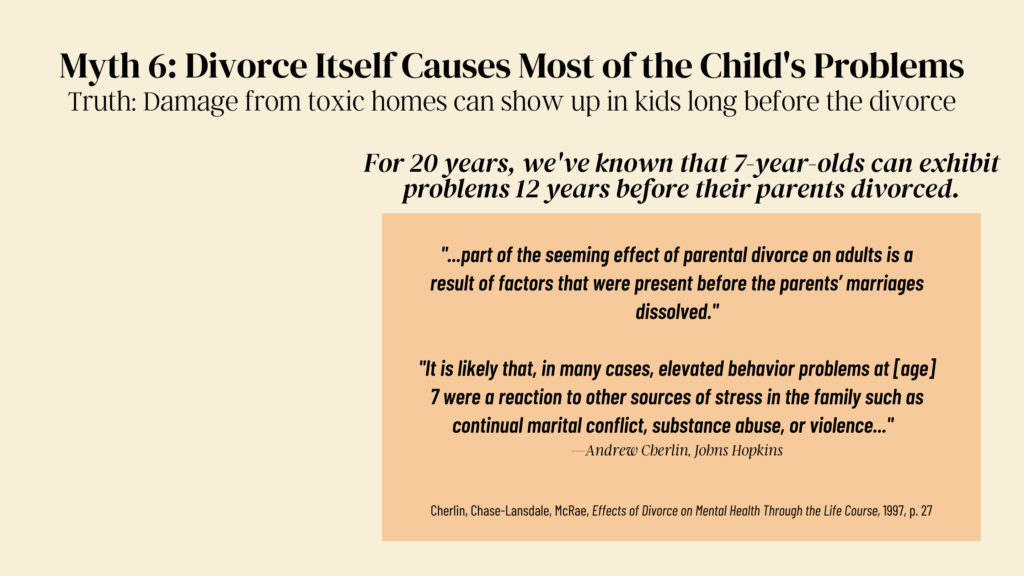
Slide 30:
Before I tell you about the ACE Study of 1998, I want to say something: No one ever told me about the ACE study. Not my pastor, not the church counselors, not the Christian radio programs I listened to. We did not know.
But family researchers have known this for a long time: If there’s abuse in your home, early intervention is required.
Doctors and researchers have known since 1998, thanks to the huge 17,000 participant ACE Study through Kaiser Permanente, that children who have been abused—or witnessed abuse, substance abuse, or mental illness (such as the destructive personality disorders)— are at a higher risk when they become adults, for major diseases.
The more categories they’d been exposed to, the higher the risk is, including increased health risks for alcoholism, drug abuse, depression, and suicide attempts, plus an increase in smoking, high number of sexual intercourse partners and sexually transmitted diseases.
So let’s look at the 1998 list of Adverse Childhood Experiences.
[READ THE LIST ON THE SLIDE]
But I never heard this, did you?
I always heard the message that getting divorced would correlate with our children having multiple sex partners. But this study correlates the ACEs with having multiple sex partners. Now years later they added “parents’ divorce” to this list, bringing it up to eight categories, and that makes sense because we know that divorce can be damaging to kids, especially in lower-conflict homes.
The world has known about the dangers of abuse and destructive families for more than 20 years. Why didn’t anyone tell us this?
SLIDE 31:
Remember how we heard that our kids would fail in life if we got divorced? They would drop out of school, do drugs, get pregnant…on and on? Well, it turns out that when you look closely at these studies—by family type—kids raised by single parents usually do as well or only slight worse than kids from two-parent married homes.
Let me show you a couple of studies where kids of divorce do indeed fare slightly worse than kids from 2-parent married homes. The first is this study of substance abuse by kids ages 12 through 17.
The green is kids who abuse drugs or alcohol and the white is kids who don’t.
So, If you are divorced, your kids are not likely to have alcohol or drug problems. The vast majority of kids from single parent and stepparent families do not have any substance abuse problems. In fact hardly any kids, from any type of home have a drug or alcohol problem. Only six in 100 kids from single mother homes did. And only 5 in 100 kids from married two-parent homes did.
Look who has the lowest rates! It’s a home with a mom and dad and another adult, perhaps a grandma or aunt or uncle.
Now let’s look at behavior problems at school…
Slide 32:
Now one day, a friend told me that kids of divorce were 60% more likely to have major behavior problems and pointed me to this article.
The article portrayed some national data in a way that suggested to my friend that children of divorced parents were doomed. This graph looks scary! It looks like kids from divorced homes are a lot more likely to get suspended or expelled from school.
But look at the scale of the graph. It is zoomed in! And shows only 16%.
What if we saw it more realistically—at 100%?
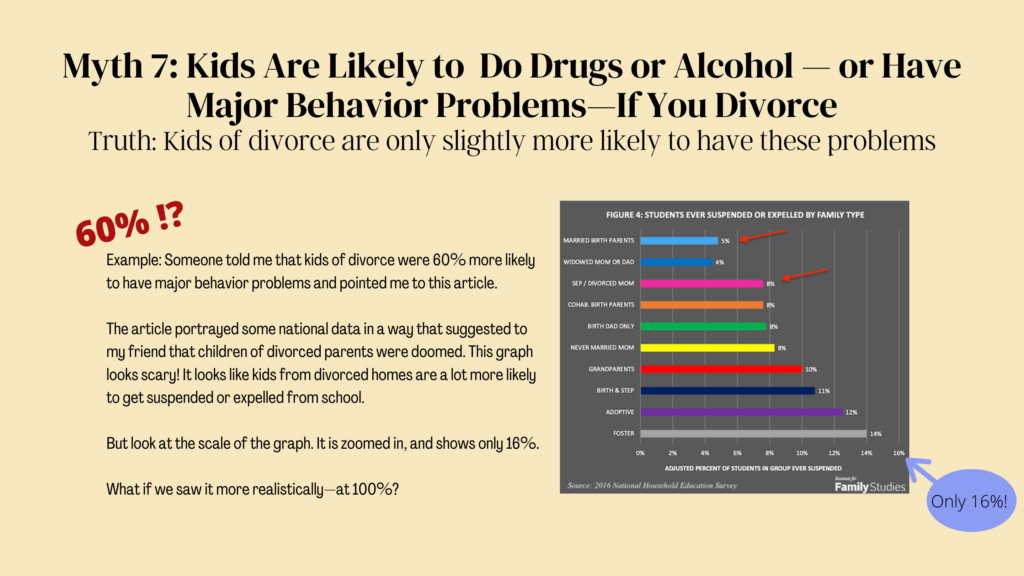
Slide 33:
Here’s how it looks at 100%. Not so scary, after all, is it?
Hardly ANY kids from ANY type of family get expelled or suspended!
Look at the medium blue line: Only 5 in 100 kids from married birth parent families do.
Look at the bright pink line: Only 8 in 100 kids from separated or divorced mom families do
See the green line? Only 8 in 100 kids from single birth-dad families do.
Heavens! Look at the yellow line: Even never-married moms who chose to keep their child do a pretty decent job!
But did you notice something? Do you see who has the lowest rate? Look at the dark blue line: Widowed moms or dad were found to have the lowest rate of having a kid with substance abuse problems (dark blue line) Only 4 in 100 kids.
Perhaps that’s due to all the loving people who surround them and get them encouragement and support and bring all those casseroles.
So don’t let marriage-at-any-cost organizations mislead you to believe that two-parent married homes bring up perfect children and single parent homes are tragic and only bring up broken destroyed children.
Whenever you hear such as claim, you need to be instantly suspicious. Because to me, it ischaracter, love, and encouragement that count … far more than marital status.
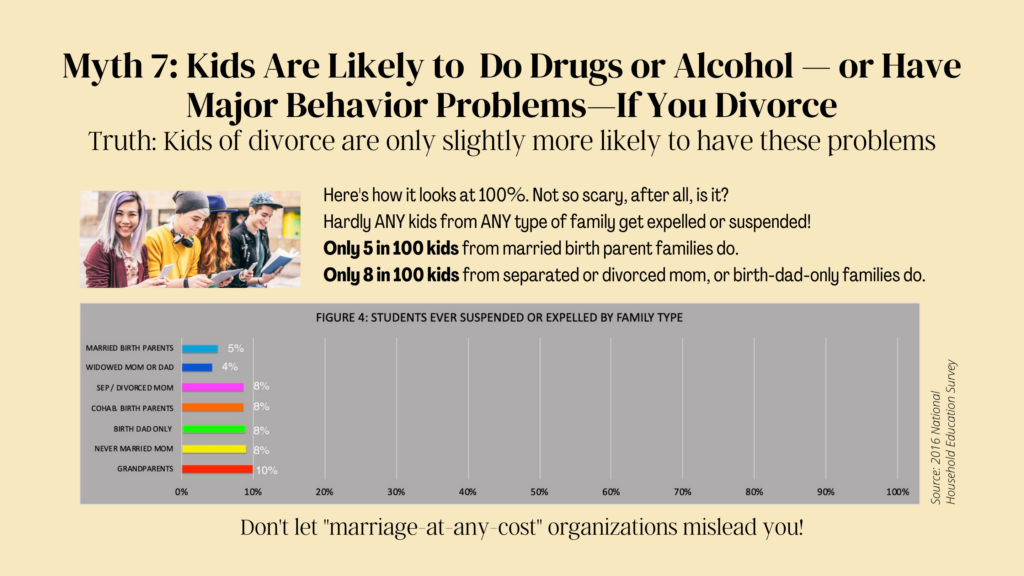
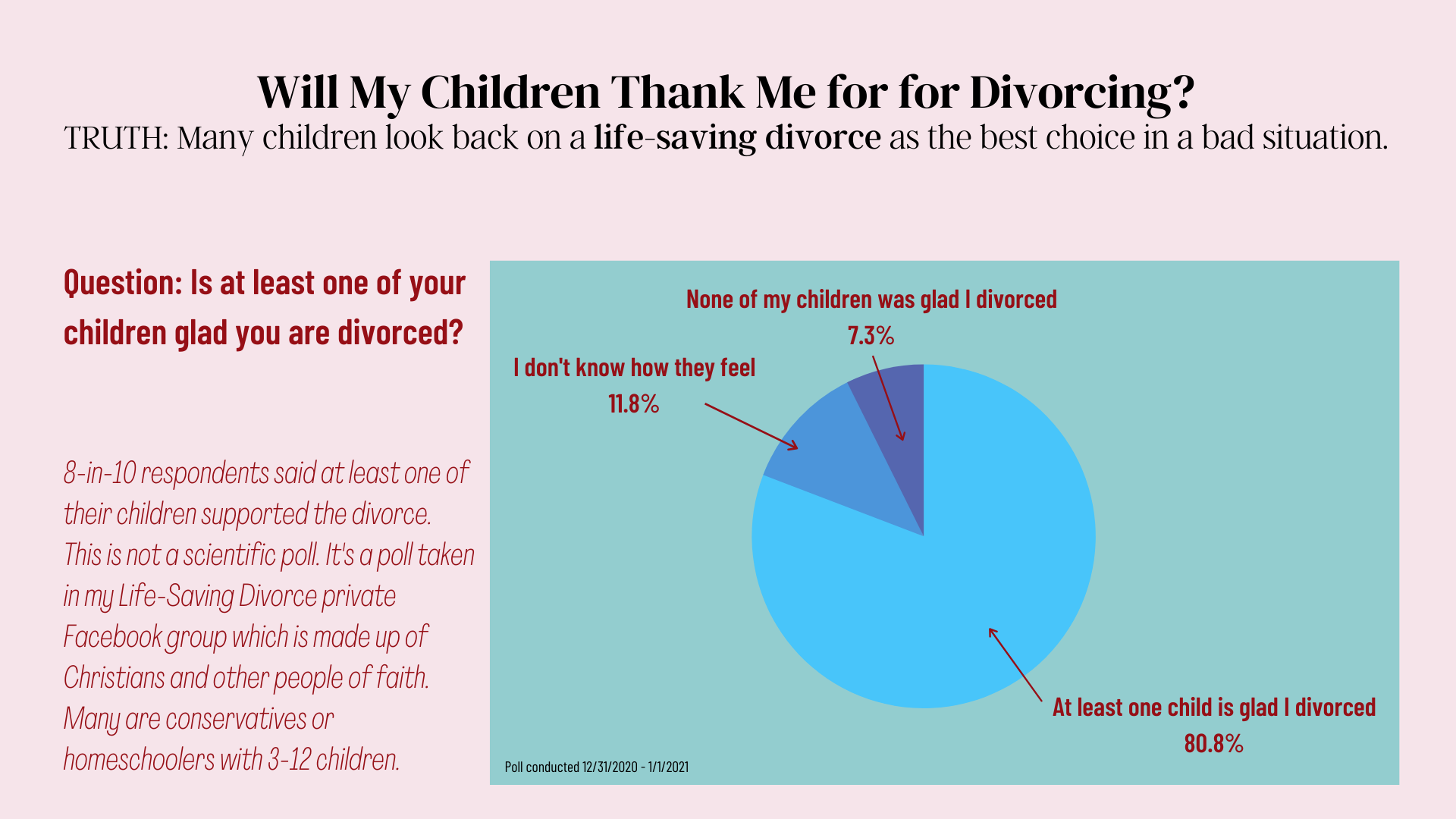

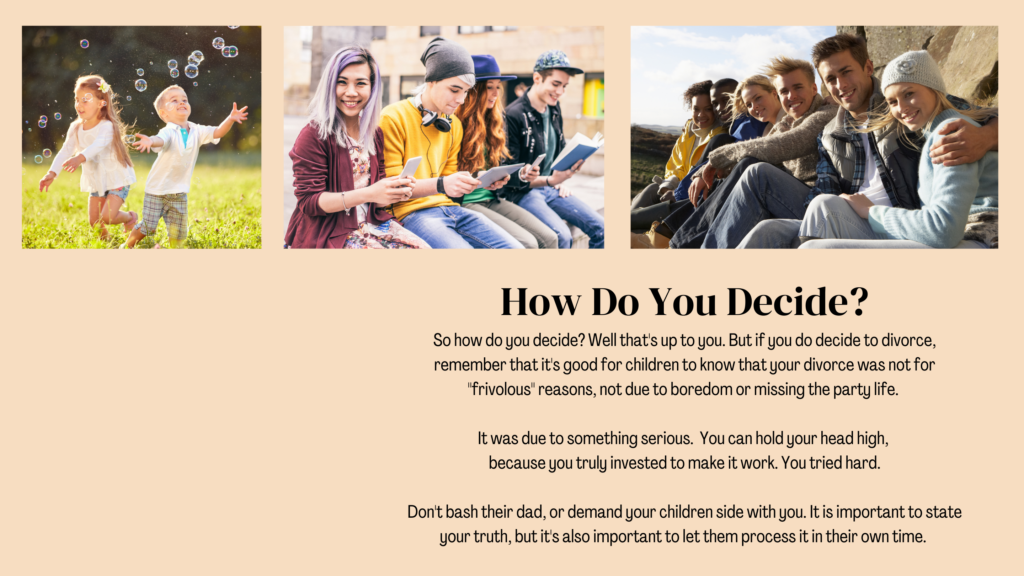
SLIDE 36:
So how do you decide? Well that’s up to you. But if you do decide to divorce, remember that it’s good for children to know that your divorce was not for “frivolous” reasons, not due to boredom for example.
It was due to something serious. You can hold your head high, because you truly invested to make it work. You tried hard. You gave it all you had.
Don’t bash their dad (or mom), or demand your children side with you. It is important to state your truth, but it’s also important to let them process it in their own time.
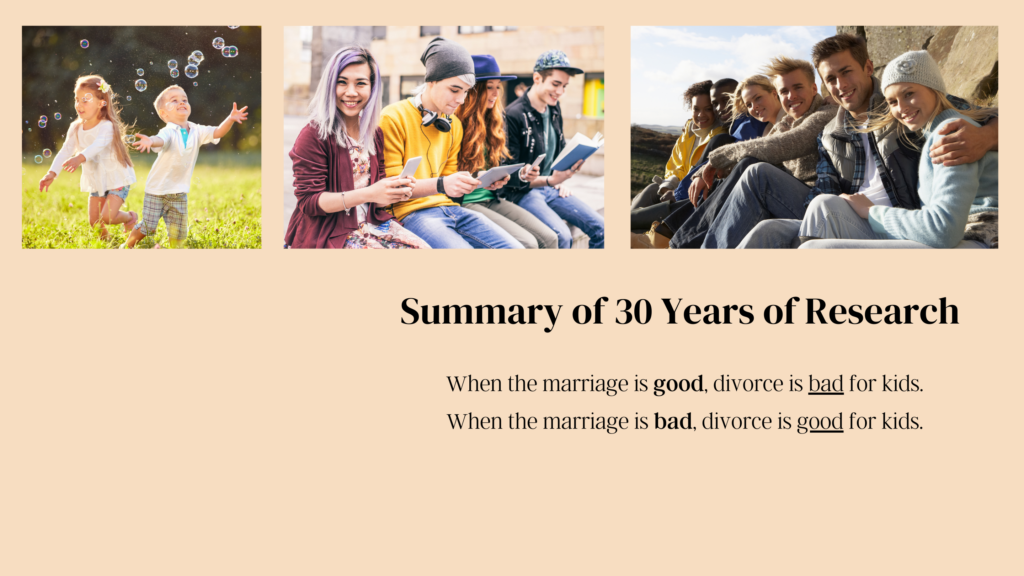
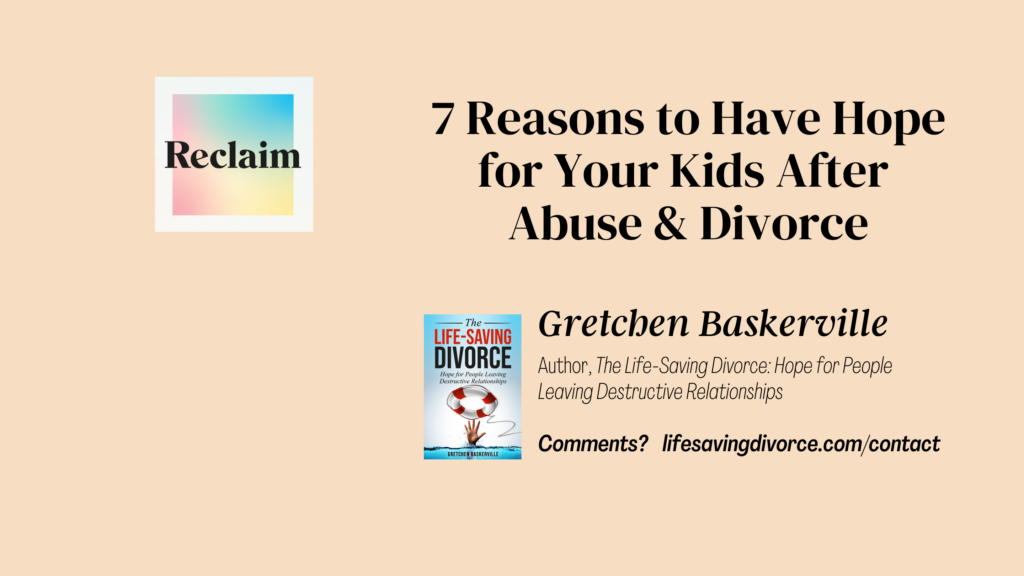


Slide 34:
I promised you seven myths and I’m going to give you eight.
Here’s your bonus myth. You children will always resent you for divorcing and ruining their lives. Truth: Many children look back on a life-saving divorce as the best choice in a bad situation.
No, I don’t have a peer-reviewed study to support my claim here.
All I’ve got are the results of a non-scientific poll I did in my “Life Saving Divorce” private Facebook group. I asked more than 1,000 members—many of whom are conservative or homeschool families—this question:
Is one or more of your children glad you are divorced?
8 in 10 respondents said yes, that one or more of their children is glad they got divorce. 1 in 10 said they didn’t know. And almost 1 in 10 said “no.”
So 8 in 10 of the parents in my group who responded said their kids favored their divorce.
SLIDE 35: Let’s look at what some of these Christian divorcees reported:- My daughter started asking me to leave when she was 14. She was worried about me.
- One woman said, the word “glad” isn’t quite the right word, but — My children all agree divorce was the right thing.
- Two of my three told me they didn’t know how I stayed with him so long
- All 3 are very glad and relieved and wished I had done it sooner!
Slide 37:
Summary of 30 years of research
When the marriage is good, divorce is bad for kids.
When the marriage is bad, divorce is good for kids.
Slide 38: Thank you for watching.
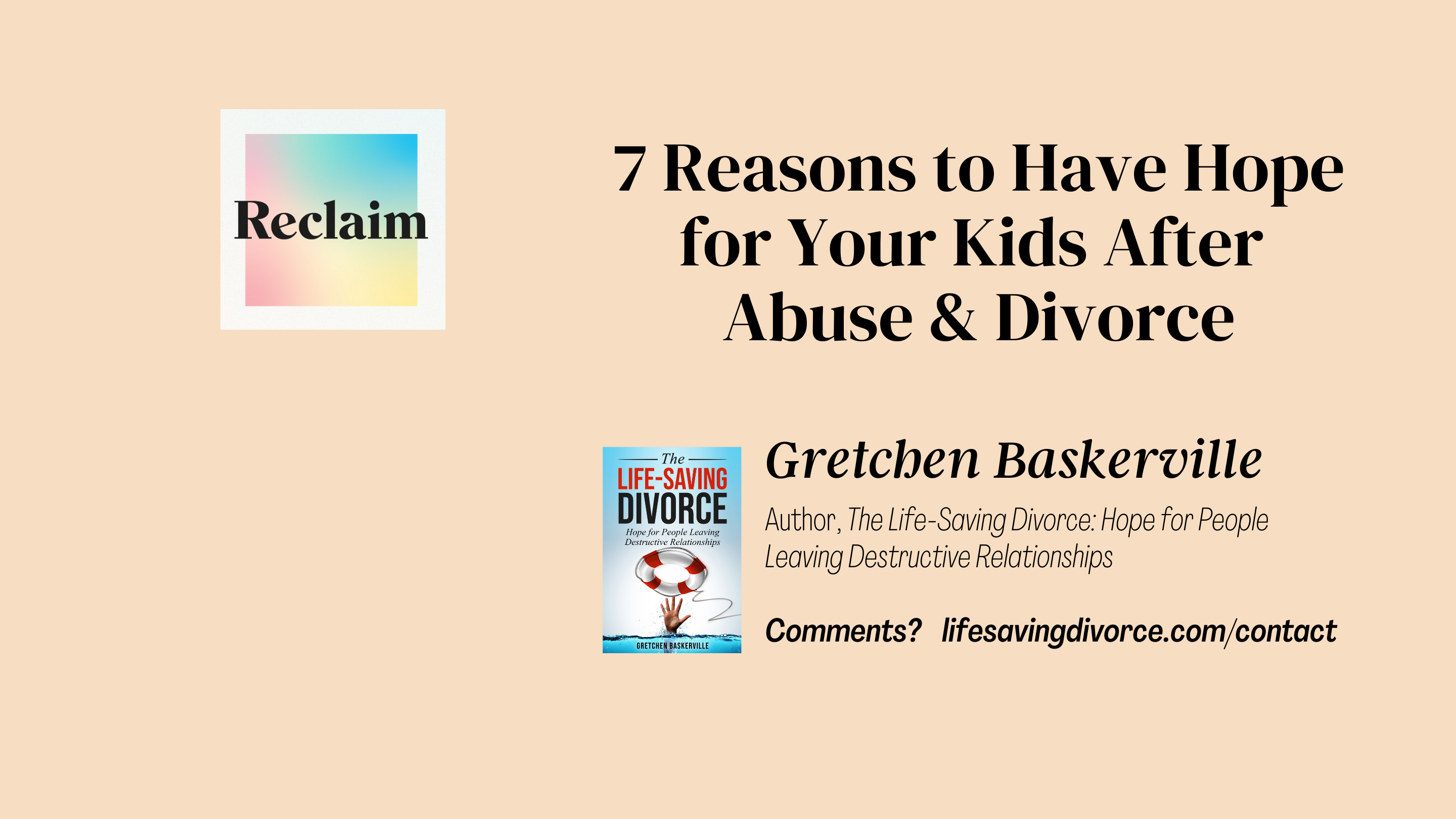
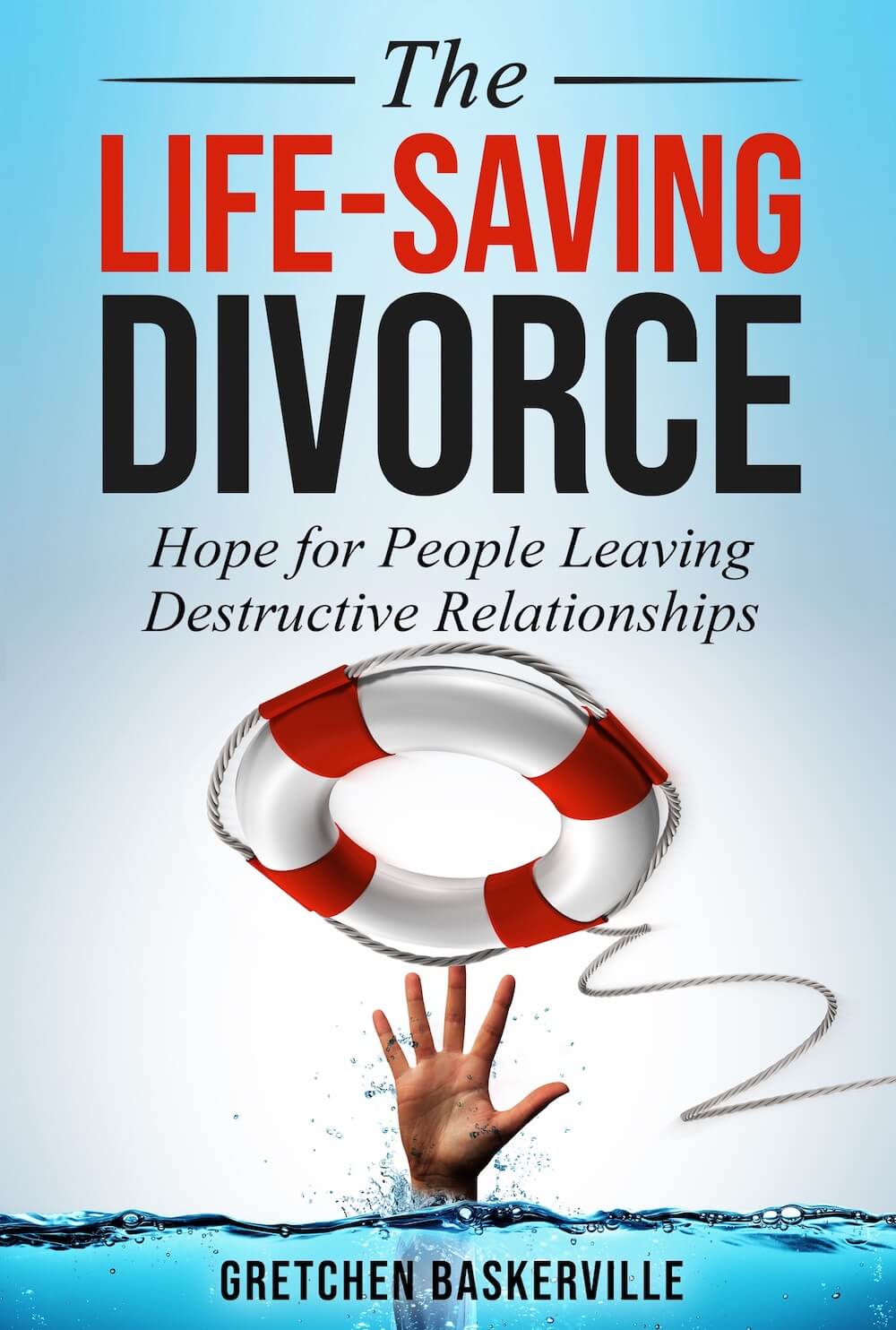
 :
:
 Buy PDF
Buy PDF